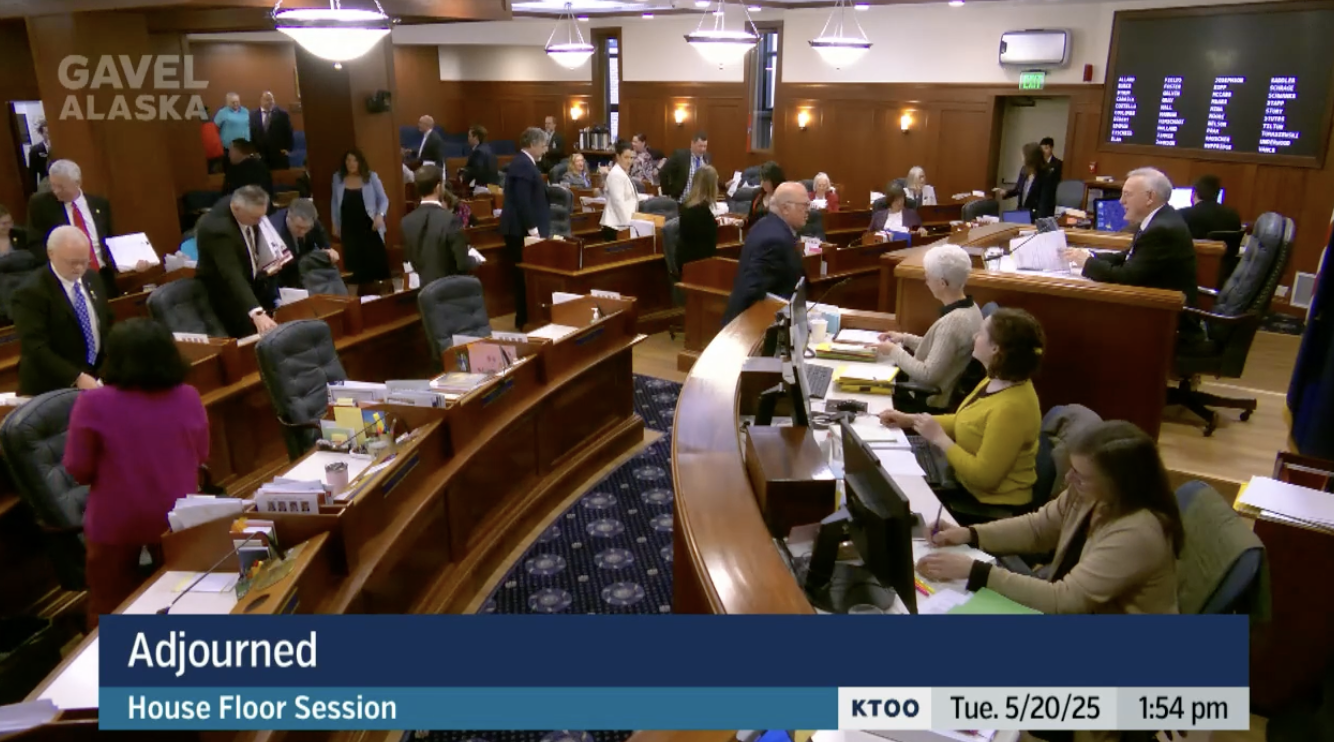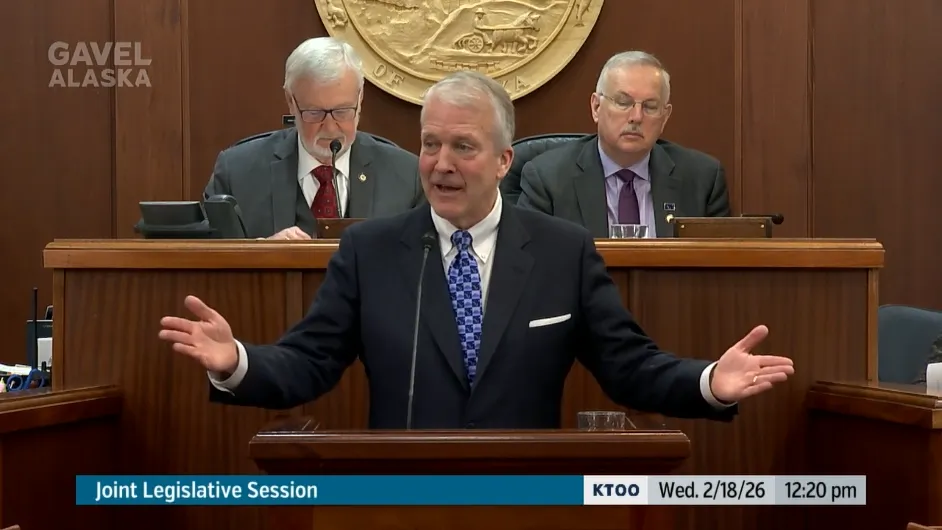Legislators hold firm, override Dunleavy's veto and adjourn
"A day early and before midnight."

Good afternoon, Alaska! It's Day 120 of the legislative session, and legislators have adjourned the session with a whole day to spare!
In this edition: Legislators have done it. Most stuck to their guns and voted to override Gov. Mike Dunleavy's veto of a compromise education bill in a quick, no-frills joint session this morning. It's the first time a sitting governor has seen legislators override a veto since 2002, marking a significant turn for a governor who just last year convinced 17 legislators to flip-flop on their support for a school bill. Though the Legislature's two multipartisan majorities didn't get everything they hoped for when they gaveled in four months ago, they did deliver on a tidy final legislative day that saw the final passage of the budget and a handful of other bills and wrapped up before 2 p.m.
Current mood: 😎
Legislators hold firm, override Dunleavy's veto

Unlike a year ago, when 17 Republicans flip-flopped on that year’s education bill (a move that ultimately cost Republicans the House Majority), most legislators held firm to their position on Tuesday and voted to override Gov. Mike Dunleavy’s latest veto of a broadly popular education funding bill. The 46-14 vote ensures House Bill 57 will become law, essentially making the current school funding levels permanent when adjusted for inflation, boosting funding for transportation, banning cellphones, setting up a task force on K-12 funding, and outlining a path for reading incentive grants to schools showing improvement.
It's far from what legislators and school advocates had hoped for when the session began four months ago, but backers say it's a realistic package given the state's grim financial outlook and political differences over the direction of education.
The vote also, in large part, reflects legislators' broad, bipartisan frustration with Dunleavy's handling of the debate over education policy in recent years. He's faced bipartisan accusations of being absent during key moments of the legislative session, leaving his allies to negotiate in the dark. And when he has been involved, he's shown incredible unwillingness to compromise, insisting that he alone knows best when it comes to education policy – and the broader direction of the state, for that matter. Rather than negotiate or really make meaningful efforts to address the opposition, he's resorted to browbeating lectures like his news conference and name-calling, labeling his opponents as "the Education Cabal." However, where his willingness to use his office and allies to inflict political pain on less-than-loyal Republicans once kept folks in line, legislators didn't seem to buy his broken-record insistence that he should get his way because he's the governor.
At the end of the day, legislators seemed to agree, this is the best we can manage.
In measured statements to the Alaska Beacon (whose reporters really knocked it out of the park with their coverage of the veto override), Republicans who voted in favor of the override defended the package as a reasonable compromise.
“My vote isn’t against the governor, it’s for my district,” said Rep. Jeremy Bynum, R-Ketchikan. “This is basically the same funding that the governor authorized in last year’s budget (and) we got some policy for it. We’ve worked hard on that.”
Bynum also acknowledged that one of the policies that Dunleavy blew up the bill over – a wild-west open enrollment system backed by the right-wing Koch network – "really requires some additional thought" because of the unintended consequences of allowing any child to enroll at any school in the state on a first-come-first-served basis. Critics said it could potentially lock some kids from attending their local neighborhood school, while others warn that it's simply another form of encouraging families with the means to attend prestige programs while leaving greater inequities in public school education unaddressed.
"So, yeah, if we want local control, we need to support local control," Bynum, who has also talked on the floor at length about the concerted pressure his constituents have put on him to back education, told the outlet. "I believe in local control."
All that said, what's next for education funding still isn't clear.
The governor can still attack school funding by using his line-item budget veto power to reduce the line in the budget, which would mark another first in Alaska politics: the first time the state has funded K12 below what's outlined in state law. It'd almost assuredly spark litigation over the state's failure to fulfill its constitutional duty to provide an adequate education to all children, but then again, Dunleavy is also no stranger to lawsuits over unfulfilled constitutional duties.
Guys, he just really doesn't like being told what to do!
That said, the 46-14 vote is key because it's also one vote more than what's needed to override a line-item budget veto. Again, that's only if legislators stick to their positions, which isn't guaranteed, but I'm saying there's a chance.
There's also the logistical issue of calling a special session or waiting until the session returns in January to take up the override vote. It's a situation that the Anchorage School District addressed in an unsigned statement sent out after the veto override, noting that they still can't rest easy.
"Even as we celebrate that progress, uncertainty still remains. The Governor has signaled he may veto all or part of the additional appropriation for public education. If that happens – and the Legislature does not reconvene to respond – every school district in Alaska might be forced to wait until January, after half of the school year is complete, to find out next year’s level of education funding. That scenario would be devastating," it explains, outlining how they would have to reopen the budget once again to make more cuts after having restored them. "We cannot afford to wait until January. Schools cannot operate on uncertainty, and students cannot learn in crisis. Districts are in dire need of assurance from the Legislature and Governor so that the focus can remain on student learning."
At his news conference on Monday, Dunleavy refused to commit to giving districts or legislators any advance knowledge about what he plans on doing with the budget, meaning everyone could be left guessing until June 31, the literal eve of the next budget year, to find out.
Why? Because he can.
No wonder folks are a little fed up.
The flip-floppers

Leading into the override vote, conservative political groups like Moms for Liberty and the Alaska Republican Women’s Clubs launched a concerted effort to convince legislators to uphold the governor’s veto. The Alaska Republican Women’s Clubs issued a particularly dire warning, saying that it’d pull any and all support for anyone who votes to override the governor’s veto.
“If you vote to override Governor Dunleavy’s veto of HB57 it is a failure of both principle and leadership. And we will not stand behind it, or behind you,” the group said. “Let us be perfectly clear. We will not endorse. We will not volunteer. We will not fundraise. We will not campaign. Not for any legislator who sides with union-backed politics and the broken education status quo over real solutions for our kids.”
Well, it looks like the Alaska Republican Women's Clubs will have a lot more time on their hands next election season.
Only three Republicans switched from voting for the measure to voting against the override, bringing the support for Dunleavy's veto to a paltry 14 Republican votes. Those three would be Wasilla Republican Reps. Elexie Moore, Jubilee Underwood, and Homer Republican Rep. Sarah Vance.
In the big picture, the 2024 election provided ample evidence that the Republican pressure tactics of the old days don't carry the same weight under the new ranked-choice voting system. Several legislators who flipped-flopped on their votes last year, making unkeepable promises that a second Big Perfect Dunleavy-approved Bill was right around the corner when Dunleavy had already given up, paid the price for their loyalty in an election that centered on school funding.
I doubt anyone's losing that much sleep over sidestepping losing politics.
Voted to override: Reps. Burke, Bynum, Carrick, Costello, Coulombe, Dibert, Edgmon, Eischeid, Elam, Fields, Foster, Galvin, Gray, Hall, Hannan, Himschoot, Holland, Jimmie, Josephson, Kopp, Mears, Mina, Nelson, Ruffridge, Saddler, Schrage, Stapp, Story, Stutes. Sens. Bjorkman, Claman, Cronk, Dunbar, Giessel, Gray-Jackson, Hoffman, Kaufman, Kawasaki, Kiehl, Merrick, Olson, Stedman, Stevens, Tobin, Wielechowski, Yundt.
Voted to uphold the veto: Reps. Allard, Johnson, McCabe, Moore (flipped), Pray, Rauscher, Schwanke, Tilton, Tomaszewski, Underwood (flipped), Vance (flipped). Sens. Hughes, Myers, Shower.
More coverage: Alaska Beacon, ADN, Alaska Public, Juneau Empire, The Alaska Current, KTUU
A new age of Dunleavy-Legislator relations

It'll be interesting to see what happens next. The veto override of a sitting governor is a rare occurrence and particularly notable when many loyalists from his own party supported the override. Dunleavy has shown little interest or capability to work with legislators and has frequently resorted to legislating through Alaska's strongest-in-the-nation veto power to gum up the works. And as long as 20 of the 60 legislators were on his side (15 of the 60 for budget vetoes), legislators could do little to force an issue. It's a reality that has stopped a lot of policies – like pensions and campaign contribution limits – from even getting off the ground.
While this newfound desire of Republicans to stick to their convictions isn't likely to move the needle on everything, it certainly is an interesting way to cap off the penultimate session of Gov. Mike Dunleavy's time in office.
It also should go a long way to inform legislators' handling of Dunleavy's latest claims that he's actually gonna maybe take the lead on a fiscal plan, so they should lay off the taxes. It's hard to ignore the fact that his latest concept of concepts of a plan – particularly the part where he knows best and you'll just have to wait to see his Big Beautiful Perfect Fiscal Plan, which he's definitely working on, and that it's not gonna be like that time he teased a sales tax and fiscal plan special session that never came – would likely push all the hard decisions until he's out of office.
Adjournment

As I wrote earlier this week, this is a session that will be defined by small victories, setbacks and rampant, cosmic-horror-levels of uncertainty as world events far outside the state's control stand to devastate the state in any number of new and novel ways. But, frankly, legislators did about as well as they could with the current circumstances and also managed to wrap things up smoother and earlier than at pretty much any time in recent memory save for the COVID-19 year.
Both Senate President Gary Stevens and House Speaker Bryce Edgmon remarked upon the smooth wrap-up of the session, with Stevens thanking everyone "for getting us to this point, a day early and before midnight."
As House Finance Committee co-chair Rep. Andy Josephson told the House while explaining the deal with the Senate on the operating budget, legislators managed to balance the budget while still finding ways to make meaningful investments in school funding, child care, child advocacy and early learning (now, whether those stand up to a veto is an entirely different question).
Several meaningful pieces of legislation, including some that have been perennial almost-finishers, also crossed the finish line this session. I'll unpack those in a future newsletter and will keep tracking those unforetold doomsday moments for the state throughout the interim.
Thanks for following along, everyone.
Until next time,
Matt Acuña Buxton
The Alaska Memo Newsletter
Join the newsletter to receive the latest updates in your inbox.




